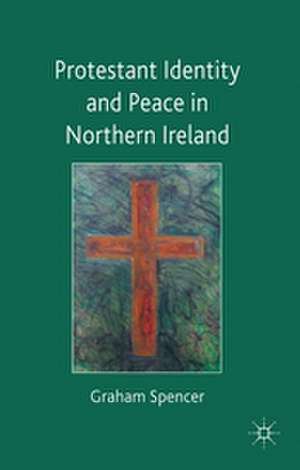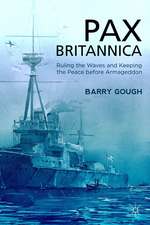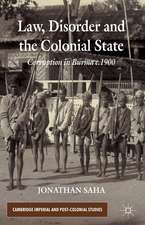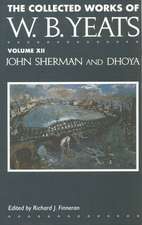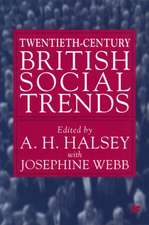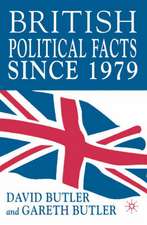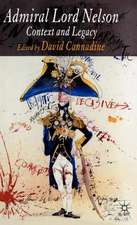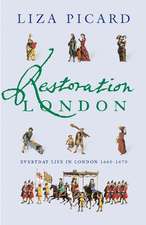Protestant Identity and Peace in Northern Ireland
Autor Graham Spenceren Limba Engleză Hardback – 10 feb 2012
| Toate formatele și edițiile | Preț | Express |
|---|---|---|
| Paperback (1) | 384.31 lei 6-8 săpt. | |
| Palgrave Macmillan UK – 2012 | 384.31 lei 6-8 săpt. | |
| Hardback (1) | 392.60 lei 6-8 săpt. | |
| Palgrave Macmillan UK – 10 feb 2012 | 392.60 lei 6-8 săpt. |
Preț: 392.60 lei
Nou
Puncte Express: 589
Preț estimativ în valută:
75.13€ • 77.99$ • 62.65£
75.13€ • 77.99$ • 62.65£
Carte tipărită la comandă
Livrare economică 24 martie-07 aprilie
Preluare comenzi: 021 569.72.76
Specificații
ISBN-13: 9780230201613
ISBN-10: 023020161X
Pagini: 271
Ilustrații: VIII, 271 p.
Dimensiuni: 152 x 229 x 23 mm
Greutate: 0.52 kg
Ediția:2012
Editura: Palgrave Macmillan UK
Colecția Palgrave Macmillan
Locul publicării:London, United Kingdom
ISBN-10: 023020161X
Pagini: 271
Ilustrații: VIII, 271 p.
Dimensiuni: 152 x 229 x 23 mm
Greutate: 0.52 kg
Ediția:2012
Editura: Palgrave Macmillan UK
Colecția Palgrave Macmillan
Locul publicării:London, United Kingdom
Cuprins
Acknowledgements Introduction Protestant History and Imagination Evangelicalism, Presbyterianism and Protestant Church Identity in Northern Ireland Dealing with Peace through Forgiveness and Reconciliation The Catholic Outlook Ecumenism: A Case Study of the Inter-Church Group on Faith and Politics Christianity in a 'Post-conflict' Northern Ireland Conclusion Bibliography Index
Recenzii
'Graham Spencer has brought us an important and thoughtful contribution with regard to 'Protestant Identity and Peace in Northern Ireland'. It is a challenging read and, I believe, will encourage the reader to critically review how they relate propositional truth in the process of loving our neighbour and living peacefully in our shared space.' - Rt Rev Dr Ivan Patterson, Moderator, Presbyterian Church in Ireland, UK
'Graham Spencer's work to date has made a vital contribution to understanding the complexities and struggles that pervade the transition from conflict to post-conflict society in Northern Ireland. Here, Graham makes the case for a greater involvement by the churches in dialogue, reinforcing progress made in the political realm. The testimony he elicits from Protestant clergy reveals a multi-layered picture of identity, but the argument he puts forward for transforming exclusive narratives into inclusive ones is a compelling and profound one. This is a necessarywork for understanding the role of the churches in Northern Ireland today.' - Duncan Morrow, Chief Executive Officer of the Northern Ireland Community Relations Council, UK
'As a well-informed objective observer, Graham Spencer provides a 'not-before-time' challenge to the churches to a process of critical self-reflection and a re-discovery of the significant but distinctive contribution of the Christian story to the complex and difficult issues of forgiveness and reconciliation in a post-conflict situation. Of particular importance is Graham's emphasis on how the distinctive characteristics of 'fundamentalism' and 'liberalism' impact either negatively or positively upon the socio-political and psychological life of a community, the causes of conflict and the search for a just and lasting peace. Here are lessons for any society in which religion has had a significant influence for good or ill, as it has in Northern Ireland.' - Rev Dr Harold Good, Former President of the Methodist Church in Ireland, OBE
'Graham Spencer has done us a particular service in enabling Anglicans and Protestants in Ireland to see themselves not only as others see them, but also as they see themselves. Through the context, substance and tenor of the interview and the responses of the interviewee one begins to see things through the eyes of others and confront what others perceive to be the marks of one's character and identity. In this way a door is opened for the examination of the unexamined and a testing of the authenticity of one's own self-image. Graham Spencer's study enables each of the denominations under scrutiny to confront those issues. It is a bracing exercise but essential, especially in the context of the search for a sustainable peace with justice in Northern Ireland. We owe Graham Spencer a great debt in so stimulating and provoking us.' - The Most Revd Alan Harper, OBE, Archbishop of Armagh, Primate of All Ireland and Metropolitan
'Graham Spencer's work to date has made a vital contribution to understanding the complexities and struggles that pervade the transition from conflict to post-conflict society in Northern Ireland. Here, Graham makes the case for a greater involvement by the churches in dialogue, reinforcing progress made in the political realm. The testimony he elicits from Protestant clergy reveals a multi-layered picture of identity, but the argument he puts forward for transforming exclusive narratives into inclusive ones is a compelling and profound one. This is a necessarywork for understanding the role of the churches in Northern Ireland today.' - Duncan Morrow, Chief Executive Officer of the Northern Ireland Community Relations Council, UK
'As a well-informed objective observer, Graham Spencer provides a 'not-before-time' challenge to the churches to a process of critical self-reflection and a re-discovery of the significant but distinctive contribution of the Christian story to the complex and difficult issues of forgiveness and reconciliation in a post-conflict situation. Of particular importance is Graham's emphasis on how the distinctive characteristics of 'fundamentalism' and 'liberalism' impact either negatively or positively upon the socio-political and psychological life of a community, the causes of conflict and the search for a just and lasting peace. Here are lessons for any society in which religion has had a significant influence for good or ill, as it has in Northern Ireland.' - Rev Dr Harold Good, Former President of the Methodist Church in Ireland, OBE
'Graham Spencer has done us a particular service in enabling Anglicans and Protestants in Ireland to see themselves not only as others see them, but also as they see themselves. Through the context, substance and tenor of the interview and the responses of the interviewee one begins to see things through the eyes of others and confront what others perceive to be the marks of one's character and identity. In this way a door is opened for the examination of the unexamined and a testing of the authenticity of one's own self-image. Graham Spencer's study enables each of the denominations under scrutiny to confront those issues. It is a bracing exercise but essential, especially in the context of the search for a sustainable peace with justice in Northern Ireland. We owe Graham Spencer a great debt in so stimulating and provoking us.' - The Most Revd Alan Harper, OBE, Archbishop of Armagh, Primate of All Ireland and Metropolitan
Notă biografică
GRAHAM SPENCER is Reader in Politics, Conflict and the Media at the University of Portsmouth, UK, and is a Fellow of the Royal Society of Arts. He has researched and written extensively on Northern Ireland and has a particular interest in reconciliation, peace and the role of identity in conflict. Previous publications include Ulster Loyalism after the Good Friday Agreement (co-edited with James W. McAuley), The State of Loyalism in Northern Ireland, The Media and Peace, Omagh: Voice of Loss and Forgiving and Remembering in Northern Ireland.
